Saturday, December 11, 2021
Williams Center for the Arts
Program and Program Notes
Dimitri Shostakovich
(1906-1975)
Festive Overture (1954)
Transcribed by Donald Hunsberger
Shostakovich composed Festive Overture for a concert commemorating the 37th anniversary of the 1917 October Revolution. The concert was to take place at the Bolshoi Theater; the conductor, Vassili Nebolsin, had need of a suitable new piece to open the program. Shostakovich was approached a mere three days before the concert.
A friend of the composer, Lev Lebedinsky witnessed the remarkable speed with which Shostakovich attacked the project:
“The speed with which he wrote was truly astounding. Moreover, when he wrote light music he was able to talk, make jokes and compose simultaneously, like the legendary Mozart. He laughed and chuckled, and in the meanwhile work was under way and the music was being written down.”
The piece, loosely modeled after Glinka’s 1842 Russlan and Ludmilla Overture, is among the more conventional pieces in the composer’s ouvre. Despite its conventionality, hints of sarcasm may be found: Shostakovich had had a difficult relationship with Stalin during his life, and often a more adventurous work (which received criticism and/or threats of exile, such as the Fourth Symphony) was followed by a “more acceptable” work (such as the Fifth Symphony). Stalin died in 1953, and there is some speculation that Festive Overture is something of a celebration of Stalin’s passing.
—
Samuel Barber (1910-1981)
Commando March (1943)
conducted by Corey Beck ’22
By the time Barber (who was born in West Chester, PA) enlisted in the Army in 1942, he had already become a prominent composer– completing works such as the Adagio for Strings, the Overture to the School for Scandal, the First Essay, his First Symphony, and the Violin Concerto. The Commando March was completed in February 1943: it was likely inspired by the bands he heard during his basic training. No documentation of either a commission or an order, though survives. The work remains his only published composition for wind ensemble, but is highly regarded as a cornerstone of the band repertoire. The premiere performance was given by the Army Air Forces Technical Command Training Band, Warrant Officer Robert L. Landers, conductor, on May 23, 1943.
—
Percy Grainger (1882-1961)
Four British Folk Songs
I. Irish Tune from County Derry
II. Shepard’s Hey
III. Horkstow Grange
IV. The Lost Lady Found
The four songs in this set were drawn from two different collections: “Irish Tune from County Derry” and “Shepard’s Hey” are published together, while “Horkstow Grange” and “The Lost Lady Found” appear respectively as the second and final movements of Grainger’s masterpiece for Wind Ensemble, Lincolnshire Posy.
Percy Grainger studied the folk music of Great Britain in much the same way as did fellow composer Bela Bartok: he traveled extensively, listened to local performances of these songs, and made accurate–sometimes too accurate–transcriptions of these performances. The melodies he captured in this way became the basis for many of his most well-known compositions.
The songs in this collection are all good examples of this research, but perhaps “Horkstow Grange” is the best example of how a transcription might be too accurate. In this beautiful melody, the ends of phrases are elongated to account for the singer’s phrasing and timing. For Grainger, the style in which these songers were performed was an important aspect of the music: capturing the “soul” of the song and reproducing it as faithfully as he could was of great artistic importance.
—
Nicolai Rimsky-Korsakov (1844 – 1908)
Procession of the Nobles (1889)
Transcribed by Eric Leidzen
One of the composers known as “The Russian Five” (along with Mussorgsky, Borodin, Balakirev, and Cui), Rimsky-Korsakov was a nationalist composer whose mastery of orchestration can be heard in works like Scheherazade and Cappricio Espagnol. He began composing at age 10, and eventually became a professor at the Saint Petersburg Conservatory.
Procession was first heard as part of Rimsky-Korsakov’s opera Mlada, where it serves as the orchestral introduction to Act II. A short-form rondo, the piece has since entered the vernacular as procession music for academic ceremonies and similar events. Though a short, fanfare-like work, the piece demonstrates Rimsky-Korsakov’s abiity to treat the wind and brass families of the wind ensemble as participants in a conversation, combining their forces at a climactic finale.
—
Eric Whitacre (b. 1970)
Lux Aurumque (2005)
Lux Aurumque began its life as an a capella choral work that I wrote in the fall of 2000. When the Texas Music Educators Association and a consortium of bands commissioned me to adapt it for symphonic winds, I rewrote the climax and included the grand ‘Bliss’ theme from my opera Paradise Lost. Lux Aurumque received its premiere at the 2005 conference of the Texas Music Educators Association, and is dedicated with deep admiration for my dear friend Gary Green. – Eric Whitacre
The text of the original choral version (a poem by Edward Esch):
Light,
warm and heavy as pure gold and the angels sing softly
to the new-born baby.
—
David Maslanka (1943-2017)
Give Us This Day
(A Short Symphony) (2006)
I. Moderately Slow
II. Very Fast
David Maslanka’s Give Us This Day (A Short Symphony) was composed in 2006. The work, in two connected movements, combines an intimate use of timbre and texture with moments of great power and intensity. Composed for a consortium of 14 high school and collegiate wind ensembles, the attempts, in Maslanka’s words, to make “the connection to reality, and by reality I mean a true awakeness and awareness. Give Us This Day gives us this very moment of awakeness and alive awareness so that we can build a future in the face of a most dangerous and difficult time.” Maslanka continues: “I chose the subtitle because the music isn’t programmatic in nature. It has a full-blown symphonic character, even though there are only two movements. The music of the slower first movement is deeply searching, while that of the highly energized second movement is at times both joyful and sternly sober. The piece ends with a modal setting of the choral melody Vater Unser in Himmelreich, no. 110 from the 371 Four-part chorales by Johann Sebastian Bach.”
LCCB Roster
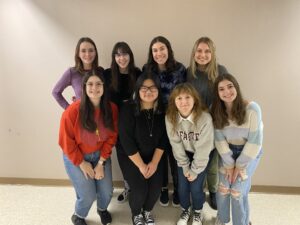
Flute
Allison Berardi, Principal
Samantha Semsel
Sophie Palter
Emma Hartman. Associate Principal
Jenna Tempkin
Marisa Palmucci
Lauren Kaye
Brianna Leopold, Piccolo
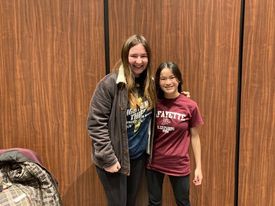
Oboe
Olivia Hofmann
Olivia Bamford
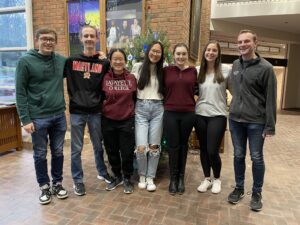
Clarinet
Julia Cassidy, Associate Principal
Ryan Wedeking, Associate Principal
Emily Rice
Presley Anderson
Priscilla Wu
William Cassidy
Matthew Olson
Ashley Kushner, Bass
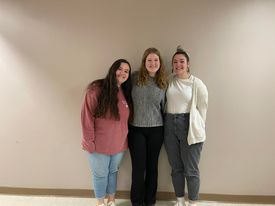
Bassoon
Avery Besch
Kiki Fasce
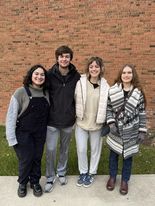
Saxophone
Ben Wenger, Principal (alto)
Alex Kmetz (alto)
Chloe Williams (tenor)
Ella Clabaugh (baritone)
Horn
Michala Dennis
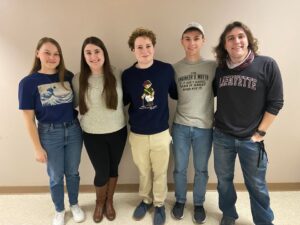 Trumpet
Trumpet
Zach Freiheiter, principal
Drew Borek
Susanna Hontz
Olivia Lattanzi
Devin Arnold
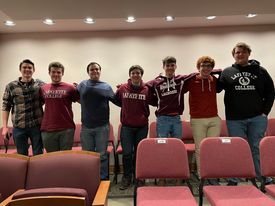 Trombone
Trombone
Ryan Pignotti
Ben Hartman
Christopher Taverner
Euphonium
Ben Gordon
Tuba
Tim Paulis, Principal
Jack Kerekes
Double Bass
Quintin Sefton
Piano
Manaka Gomi
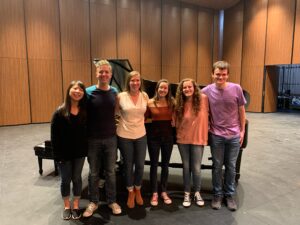
Percussion
Corey Beck, principal
Anna Zittle
Jen Galdieri
Paul Zdankiewicz
Ellie Batchelar
Seniors
Guest Performers (LCCB Alumni)
Conductor Biographies
Kirk O’Riordan
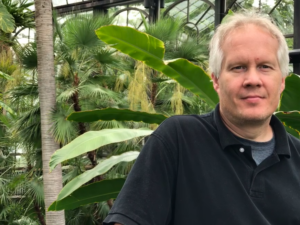
Kirk O’Riordan’s music has been referred to as “unapologetically beautiful” and is often praised for its uniquely “visual” qualities that depict a wide range of striking moods. His debut compact disk, Strange Flowers, was praised by Audiophile Audition as “one of the most impressive and beautiful collections of chamber music I have heard in awhile….This is all just so lovely and invokes exactly the emotions that good music should be able to induce in all of us.” Gramophone Magazine praised O’Riordan as “a composer for whom imagery is a defining inspiration.…[he] is a deeply sensitive composer who savours going gently into the night.” (April 2014). His recording of his Twenty-Six Preludes for Solo Piano—by pianist Holly Roadfeldt—has attracted similar praise: they “are similarly atmospheric and proceed to unfold like a magical tapestry. Each of the 26 Preludes seemingly comprising of warp and weft forming a myriad of pixels of little pictures that ultimately combines to form a moveable feast for both eye and inner ear. O’Riordan’s miniatures are informed by languorous beauty and profundity, the lyrical variations of each often feature elaborate embellishments, as well as sudden dissonant figurations that seem to mimic the gravity-defying leaps of the gazelle…” (World Music Report, April 2017)
His most recent release, Autumn Winds, has been similarly praised. “Compositionally it seems on first blush simple at heart but as one listens the details both flesh themselves out and freshen the listening mind so that it all seems increasingly evergreen and more complex than at first might be thought.” (Gapplegate Music Review, 2020) “[O’Riordan] is not strictly speaking a minimalist, yet he possesses that rare quality of capturing a vivid musical landscape with Webern-like efficiency.” (The Morning Call).
O’Riordan (b. 1968) is an active composer, conductor, saxophonist, and teacher. His music has been performed in Canada, China, Costa Rica, Cyprus, Finland, Italy, and Russia; and in nearly all of the fifty United States. In 2009 Dr. O’Riordan joined the faculty of Lafayette College where he serves as Associate Professor of Music and Director of Bands, teaching courses in music theory, and composition. In addition, conducts the Lafayette College Concert Band and Contemporary Music Ensemble. He holds the Doctor of Musical Arts degree from Arizona State University; the Certificate of Performance in Saxophone from Northwestern University; and three Master of Music degrees. Apart from his active teaching and composing schedule, Kirk is an avid fan of obstacle course racing.
Corey Beck ’22
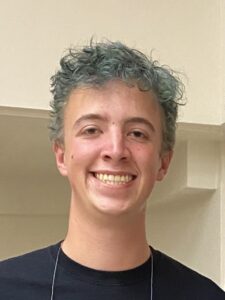 Corey Beck is a Senior Math and Physics Dual Degree at Lafayette College. Deeply involved in music on campus, Corey is the Assistant Conductor for Concert Band, Conductor for Pep Band, and Ensemble Assistant for Percussion Ensemble. Corey takes lessons with Dr. Kirk O’Riordan in conducting and Dr. Larry Stockton in percussion. With Dr. Stockton, Corey has also done study and research into non-Western music, particularly Japanese drumming traditions. Elsewhere on campus Corey is an executive board member of Alternative School Break, and is involved with Math Club, Women+ In Physics, and Physics Club.
Corey Beck is a Senior Math and Physics Dual Degree at Lafayette College. Deeply involved in music on campus, Corey is the Assistant Conductor for Concert Band, Conductor for Pep Band, and Ensemble Assistant for Percussion Ensemble. Corey takes lessons with Dr. Kirk O’Riordan in conducting and Dr. Larry Stockton in percussion. With Dr. Stockton, Corey has also done study and research into non-Western music, particularly Japanese drumming traditions. Elsewhere on campus Corey is an executive board member of Alternative School Break, and is involved with Math Club, Women+ In Physics, and Physics Club.
About LCCB
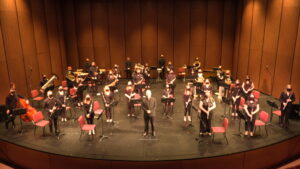
The Lafayette College Concert Band is comprised of approximately 50 students from a variety of majors who are united by a strong desire to perform the highest quality music at the height of their abilities. Participation in LCCB is open to students in any major as well as faculty and staff. The ensemble is conducted by Kirk O’Riordan, Associate Professor of Music.
LCCB typically performs one concert each semester. The repertoire is selected from traditional concert band masterpieces, newer works by established and emerging composers, commissions, and orchestral transcriptions. Past concerts have included works such as Husa’s Music for Prague 1968, Bernstein’s Symphonic Dances from West Side Story, both Holst Suites, Grainger’s Lincolnshire Posy, and Mussorgsky’s Pictures at an Exhibition. LCCB has premiered works by composer/conductor Kirk O’Riordan and 2010 Pesky Artist in Residence William Pfaff as well as Anna Zittle ’22, Justin Kogasaka ’22, Ashley Kushner ’19, and Zach Jones ’13.
Students enroll for 1/4-credit. Open to all students, faculty and staff, LCCB employs a wind ensemble model for instrumentation. A seating audition is required before the first semester of participation. Due to the large numbers of flutists, clarinetists, saxophonists, and trumpeters, the number of available seats in these sections is limited.
The Assistant Conductor Program
The Assistant Conductor program at Lafayette College is a unique opportunity for students to study conducting in an immersive, highly intensive environment. Open only to one or two students at a time, the program seeks highly advanced musicians who exhibit natural leadership potential and excellent musicianship. While serving as the Assistant Conductor, she/he conducts the ensemble on at least one piece in performance and lead all of the rehearsals for that performance. In addition, that person directs the Lafayette College Pep Band, the annual student-led musical, and will often conduct performances with other ensembles, such as the Percussion Ensemble and Contemporary Music Ensemble.
Students interested in becoming the LCCB Assistant Conductor study conducting for a year before assuming that role. In that time they develop their conducting, score study, and leadership skills as well as lead the Pep Band. By the time a student has completed their tenure in the position, she/he has accumulated a tremendous amount of podium time: more than almost any undergraduate conducting program in the country.
LCCB Assistant Conductors
Samantha Semsel ’25 (2023-2025)
Corey Beck ’22 (2021-2022)
Katie Rice ’21 (2019-2021)
Kyle Street ’19 (2018-2019)
Peri Chain ’18 (2016-2018)
Ryan Dupuis ’16 (2015-2016)
Sam Freiheiter ’15 (2014-2015)
Madeline Friese ’14 (2013-2014)
Alex Cutrone ’13 (2011-2013)
Blurred Days CD
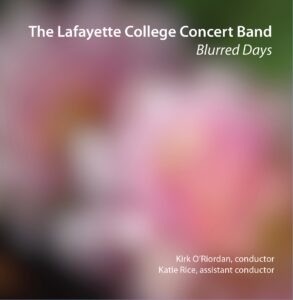 The LCCB Blurred Days CD is available for purchase ($20) in the lobby. Proceeds will support the J. Larry Stockton Music Scholarship Fund, which will provide funding for private lessons scholarships for Lafayette student musicians.
The LCCB Blurred Days CD is available for purchase ($20) in the lobby. Proceeds will support the J. Larry Stockton Music Scholarship Fund, which will provide funding for private lessons scholarships for Lafayette student musicians.
Like many bands and other performing ensembles across the country, we have had to adapt to the pandemic. For us, this has meant that we have not been able to work together, in person. This has always been a band that thrives on its sense of community, and not having that has been hard on all of us.
But rather than mourn what we have lost, we have searched for opportunities within our remote format that are unique. Working in isolation has allowed us to re-examine the possibilities of the Wind Ensemble as an entity—to re-imagine what is possible with this collection of sounds.
The five pieces on this CD were written especially for us, and especially for our situation. Each of the pieces was conceived to take advantage of techniques that would not be possible in a traditional concert—effects on a person-by-person level, or writing for flutes in their lowest register.
To make these performances, each student recorded his or her part on their phones or computers and uploaded them to either a shared drive or to the web-based recording service Band Lab. Katie Rice assembled the tracks and performed the first round of editing. I took the tracks she finished and combined them into the final product, completing the pre-production audio work.
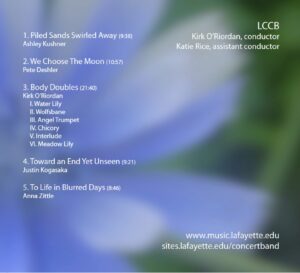 Every student has a unique track in the recording, which allows us to use studio effects on a person-by-person level. With many of the pieces, the individual parts were created to be non-linear—we could create specific sonic effects and duplicate them in the recording software. Several of the pieces incorporate improvisation, narration, and other unconventional techniques.
Every student has a unique track in the recording, which allows us to use studio effects on a person-by-person level. With many of the pieces, the individual parts were created to be non-linear—we could create specific sonic effects and duplicate them in the recording software. Several of the pieces incorporate improvisation, narration, and other unconventional techniques.
Our goal was to re-imagine what the wind ensemble could be under the conditions of remote instruction. I believe we have done that, and each composer solved that problem in wildly different ways. As conductor and professor, I am profoundly grateful to and proud of these students and what they have accomplished under very difficult circumstances.
Tracks:
1. Ashley Kushner: Piled Sands Swirled Away (9:37)
2. Pete Deshler: We Choose the Moon (10:51)
3. Kirk O’Riordan: Body Doubles (21:40)
I. Water Lily
II. Wolfsbane
III. Angel Trumpet
IV. Chicory
V. Interlude
VI. Meadow Lily
4. Justin Kogasaka: Toward an End Yet Unseen (9:24)
5. Anna Zittle: To Life in Blurred Days (8:48)
The Lafayette College
Department of Music
The Department of Music is dedicated to providing a dynamic, engaging, and challenging musical environment for all students, regardless of major. Our performance and academic experiences enhance the liberal arts mission of the College, enrich the cultural environment of the College community, and promote musical understanding through performance, historical and analytical study, and exposure to the diversity of musical expression.
We welcome all students who seek a rigorous and energetic study of music in a community-based, supportive environment. Music courses are available to any student, and many meet the College’s requirements for the Common Course of Study. Our ten ensembles are open to students in any major, and perform music from a wide array of diverse stylistic, cultural, and aesthetic traditions. Private lessons are available for beginners through advanced players and are taught by an exceptional applied faculty.
The Department of Music offers a Major (B.A.) and a Minor. Both programs are designed to easily combine with majors in other departments–this is very common with our students. We are dedicated to providing a wide variety of musical experiences for all interested students. We strongly encourage everyone to continue to build upon previous musical experiences and to develop new ones.
For more information: